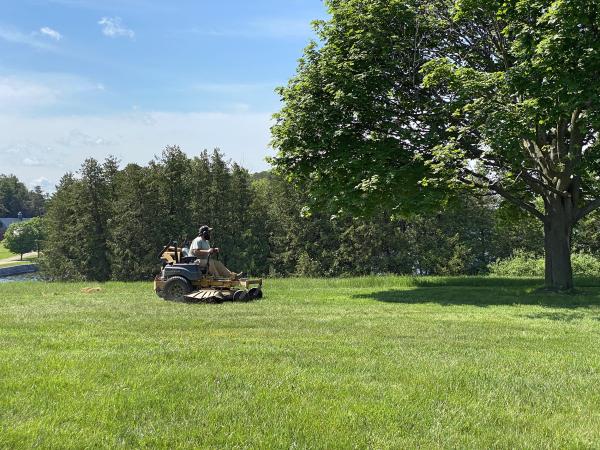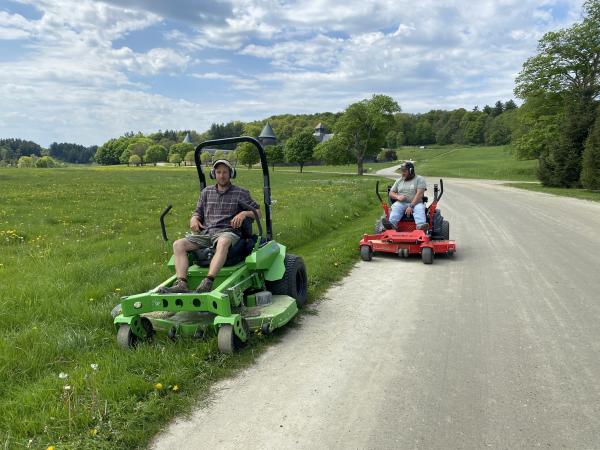Holly- the Shelburne Farms team should check out the electric mowers- and lose the gasoline entirely.
Mowing Update: Reducing Our Carbon "Lawn"-print
Last year we reduced the total acres we mowed, mowed less frequently, and raised the blade when we did. Limited seasonal staffing due to covid gave us this opportunity to scale back our practices and improve our environmental outcomes. So what happened?
Our new strategy reduced our mowed acres by a third, and our total hours of mowing by close to 50%. Here’s how it broke down.
Less lawn and fewer mowing hours meant a smaller carbon footprint. Each year, at least 6 gallons of fossil fuel are needed to mow an acre of lawn, and each gallon of gas generates nearly 20 lbs of CO2. Doing the math, mowing 874 acres of lawn in 2020 produced over 100,00 pounds of CO2, compared to over 150,000 pounds in 2019. It’s too early to know whether the mowing schedule also benefited pollinators or other flora and fauna, but we’ll be keeping an eye on that. (If you visit, you can, too!)
We’ll continue with our 2020 plan this year: mowing fewer acres, and some less frequently, including larger swaths like the north lawn of the Farm Barn or the Breeding Barn lawn. All lawns apart from mowed ribbons beside the roads and trails will only be cut 3-4 times a year. And we’ll still adhere to “Raise the Blade” – an environmental campaign of the Lake Champlain Basin Program and continue to highlight the Unlawning America project of Burlington City Arts.
We’re also excited to be adding two electric mowers and electric trimmers to our mowing management plan. These mowers generate zero direct carbon emissions, no harmful air pollutants, and make far less noise than a conventional gas-powered lawn mower. (According to California’s Air Resources Board, operating a commercial lawn mower for just one hour emits as much pollution as driving a Toyota Camry about 300 miles.) Learn more about the Mow Electric! campaign in Vermont.
We’re looking forward to a second year of mowing less with more environmentally friendly equipment. Maybe it will inspire you to rethink that trim swath of green in your own backyard or along your street.
Comments
What are the indirect carbon emissions for the electric mowers? Nice to say zero at the farm but there's carbon emissions next to someone house.
I am really happy to read about the reduction of lawn mowing on the farm! That is great for so many reasons.
I support the thought, but had this been fully thought out. Electric cars only recently became more energy efficient than gas powered; do we know the same about mowers? And that ignores the energy used in mining to create the necessary batteries, after which the analysis is still conflicting as to what is "better". And is it a.slam dunk that longer grass is better for us all? Seems like longer grass probably retains more heat, which is in part why is is mowed here in FL as often as possible. Might be a good thing in VT? Just asking. I am not a climate change denier, but tend to wonder about green initiatives that seem obvious but are not forthright about obvious and not so obvious offsets.
Keep up the good work regardless; I look forward to visiting again when VT and Canada fully reopen. But also understand that it is frustrating that it has not happened; out kids went back to school 100% last September and most everyone here is now vaccinated.
More electric power!
Thank you for all you do. I would encourage you to add more and more electric mowers and lawn management equipment and consider the "Raise the Blade." campaign to reduce nutrients into the lake.
If it weren't for invasive plants and new tree seedlings, we wouldn't mow at all. How do you time your mowing vis-a-vis invasive life cycles?
What I would really like to know, is the limits of grass growth - when the seed heads arrive - that is the end of growth? How do you deal with the thatch created from leaving the mowed grass on the fields/lawns? Our hay fields, which we do not hay, just cut as infrequently as possible - they are managed for bobolinks - are prone to invasives. How do you deal with that?



